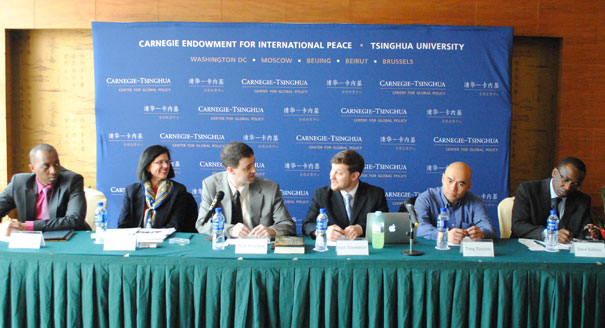Registration
You will receive an email confirming your registration.
IMGXYZ4325IMGZYXAfrica remains both a challenge and opportunity for both China and the United States. China’s surge in trade and investment in Africa has left critical questions for U.S., African, and Chinese policies. The two countries differ in their policy approaches toward development, aid, security, and energy in Africa. It remains to be seen whether China and the United States will cooperate or compete in Africa’s development.
The Carnegie-Tsinghua Center for Global Policy hosted a roundtable discussion on the future of Chinese and U.S. policies toward Africa. The event featured a variety of Chinese, U.S., and African diplomats and scholars. Carnegie-Tsinghua's Matt Ferchen moderated.
New Scramble for Africa
- Window of Opportunity: Joshua Eisenman, a senior fellow in China Studies at the American Foreign Policy Council, observed that Washington’s foreign policy circles have become increasingly focused on the growing ties between China and Africa. He noted that John Kerry’s nomination proceedings for secretary of state included speeches on how Africa presented job and investment opportunities for U.S. citizens. The United States could, Kerry concluded, take advantage of Africa’s changing global role and engage China in competition in ways that benefit U.S. workers and consumers.
- United States as a Competitor: Eisenman stated that African trade only constitutes a small part of overall U.S. global trade. In addition, Chinese exports to Africa are similar to the products exported to the United States. Thus, Eisenman noted, the United States could not compete with China directly in these categories. Another thing to consider, he added, was that Africa exports primary materials, which are processed in China and then sold to the U.S. market. This global value chain makes it difficult for the United States to compete directly with China.
Ongoing Challenges in African Trade
- Deficit Fuel Anti-Chinese Sentiments: While trade relations between Africa and China seem to enjoy a healthy balance at the aggregate, China’s commercial success produces trade surpluses in African countries with natural resources while suffering a deficit in countries without these resources. Trade deficits, Eisenman noted, materialize at the local level in some nations as more and more African traders feel squeezed out by the increasing Chinese competition in the marketplace. Consequently, Eisenman stated that African politicians have exploited anti-Chinese sentiments to win elections.
- China Free of Responsibility: An African diplomat explained that China had entered the African market with clear and distinct trade objectives. Therefore, it was the African governments’ responsibility to solve their deficit problems. He added that China has three principal objectives: source raw materials, export finished consumer products and machinery, and expand China’s economic presence in the continent through trade and investment.
- Rebalancing Trade: One Chinese scholar stated that Africa may become the next global manufacturing hub, causing a shift in both the composition and balance of trade. He explained that this would enable a healthier and sustainable trade relation between China and Africa. Eisenman disagreed, responding that China’s economic success is due to the prowess of its manufacturing sector. Considering the factors of technology, supply chain linkages, and work force quality, he stated that it was unlikely for China to move its manufacturing base to Africa.
What’s Next for China and the United States
- China: Most panel discussants agreed that the approaches used by China and the United States are complementary. For example, U.S. aid goals, such as poverty reduction, can benefit from China’s large-scale infrastructure projects. At the same time, China’s trade objectives benefit from the growth in human capital that stems from U.S. aid efforts in the continent. However, one African member of the audience challenged this interpretation, contending that various Chinese investments do not necessarily benefit the rest of the population, much less U.S. interests in Africa. In response, one Chinese scholar insisted that China is expected to invest 500 billion dollars in Africa throughout the next decade and that China views Africa as an important partner.
- United States: Eisenman stated that the United States remains the largest capital stock investor on the continent, suggesting its national interests are bound with Africa’s. In 2012, President Barack Obama launched a new Policy Directive for Africa that defined a strategy of not only increasing the share of trade between the United States and Africa, but also changing its composition. This policy focuses on exporting more products to an increasingly dynamic continent and creating incentives for manufactured products from Africa to enter the U.S. retail market. Eisenman stated that increased involvement by the United States in Africa should not necessarily translate into competition with China.
Discussants: Dave Kabiru, Maria Rendon, Emile Rwagasana, Paige Snider, Tang Xiaoyan, Zhao Changhui
